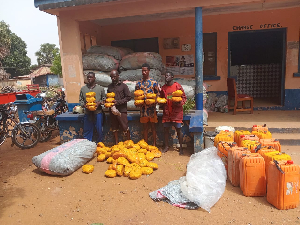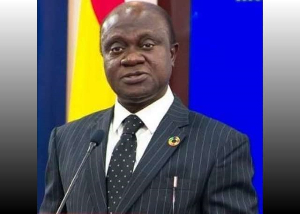To assess or evaluate the performance of a political leader is not as simple as evaluating a teacher in a classroom, where the syllabus serves as a contractual agreement between the teacher and his or her students on the one hand, and the teacher and his or her university on the other hand. Politics is a tough and complex terrain that encompasses the planned, the unplanned, the foreseeable, the unforeseeable, the externalities, and many more factors that can be challenging to prudent political decisions. With that said, I do not think that it is fair to think that Barrack Obama has not delivered the expected deliverables to the land of his father, where many see him as a son of the land.
If we are to examine the economic and political environment in which Obama is operating from, we would realize that he is not as lucky as those who preceded him, and we can only be fair to him by appreciating the enormous challenges that faced his government from its inception and continuous to impact on his government’s ability deliver on all fronts, especially on the question of Africa.
From a historical perspective, the geopolitical environment of the times from the 1950s leading to the collapse of the Soviet Union must have provided a good reason for Americans to reach out to many countries economically to win some of those countries to its side in the ideological battle with the Soviet Union. The implication was that the American public was in no mood of questioning the huge economic, educational, and military support America offered to countries seen as ideological allies. Public opinion was, therefore, favorable towards such actions.
Leading on from the above, Bill Clinton had one of the most successful economic stories in the management of the American economy in recent times. He left office with a huge surplus, so he had the luxury to initiate programs that created opportunities for many around the world including Africans. The Africans Growth and Opportunity Act, signed in May 2000 by President Clinton before leaving office, is a good example of how his economic success story affected lives across the borders of the United States.
Fast forwarding to 2000 when George Bush Jr. became president, the economy was still in good shape. He inherited huge surplus from the Clinton administration to start with. In fact, if I were asked to evaluate his contribution to the continent, I think he will tower over all American presidents of recent memory with his US$15 billion President’s Emergency Plan for AIDS Relief, which saved millions of lives on the African continent. Even though some critics regard that as a decoy to win a world over a world that was unprepared for war in Iraq, we can leave that to the arbitrations of his history.
The question now is: what is the state of the American economy and its political influence on world affairs today? The world has changed significantly. Obama has inherited huge deficits from the Bush administration, a situation that nearly brought the US economy on its knees, so to speak. New production and manufacturing enclaves have emerged around the world – China, India, Malaysia, Singapore, South Korea, and many more – providing alternatives where the US and Western Europe used to have competitive advantage. The point is that the US, saddled with huge debts and struggling manufacturing industries, has its own pressing domestic economic problems to take care of – there is the need to pay meticulous attention to domestic issues first before considering benevolence to others, Africa to be precise. What do you think public opinion in the US would be if Obama had gone out of his way to do what Africa expects from him as a son? What exactly is that expectation anyway?
In spite of all these challenges, his 2012 attempt to bring some companies together, companies that are ready to invest US$3billion in agriculture on the continent must be lauded, especially with the mitigating circumstances I have enumerated in mind. He is also currently pursuing some policies that are geared towards private-public partnership, which I hope will encourage private US businesses to partner their counterparts on the continent in business ventures. I think that is the way to go! The “begging bowl syndrome,” whereby African countries only want to be receivers must be discouraged and replaced with opportunities that are not only enduring but also empowering. In fact, there is no better way to empower our people than to partner with them in ways that are mutually beneficial to both sides of the relationship. Let’s not only learn how to fish from our development partners, let’s fish together with them from the same rivers, so our risk is there is as well and our success is there success, too.
His influence in also passing a new constitution in Kenya in 2010 must also be applauded. Being an African, I am aware that if there is any single hindrance to the continent’s development, it is the governance question, especially the abuse of power by the continent’s political elite. To this end, anything that curtails the excessive use of power by the politicians must be welcome and replicated across the continent. Kenya has shown the way, via Obama’s impetus, and other African countries must follow suit.
On the issue of his visit to Ghana and the Cape Coast Castle, I do not see how he is personally connected to the story of slavery. The father was not a slave and he is not a descendant of slaves. But his American story, based his identity of being black, inextricably links him to that narrative. I have heard some African Americans argued that he is not black enough. But who is ever black enough? We share in a common struggle and from his wife to his children and to the self, he is simply part of that heritage!
Ghana was blessed to have him. It is now the turn of other African countries to have him, too. But as he is celebrated in those countries – Senegal, Tanzania, and South Africa – the continent will be the focus of global attention once again. Our hopes of him should not be exaggerated, but must be commensurate with the realities of the global economy and polity as well as the economic and political situations he has been dealing with in his own country since assuming office.
Prosper Yao Tsikata
Opinions of Saturday, 29 June 2013
Columnist: Tsikata, Prosper Yao
Obama’s return to Africa and our expectations
Entertainment













